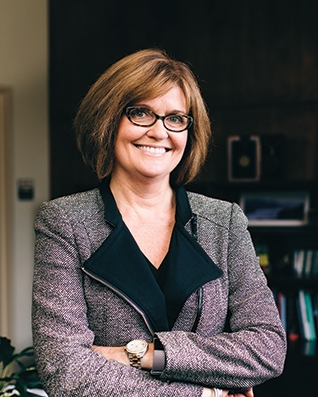First Impressions
 Photo by Brian Powell
Photo by Brian Powell
As our yearlong celebration of Purdue’s sesquicentennial wraps up this month, we’re preparing for another kind of celebration. July 1, 2020, is the 10th anniversary of the College of Health and Human Sciences. Plans are underway for a variety of activities to recognize the founding of our dynamic college, which was created to enhance student learning, bring about greater faculty collaborations and further community outreach — all aimed at improving health and quality of life. We’ll be posting information to our anniversary website at purdue.edu/hhs/10 as well as to our social media. I hope you’ll consider joining us for some or all of our celebration activities.
Part of HHS’ growth and evolution stems from how we can better serve students. On June 14, 2019, the Purdue University Board of Trustees approved the merging of two current academic units and the addition of a new one. Specifically, we will create a new Department of Public Health and also create a new, larger unit focused on the human side of business relationships as the Department of Consumer Science will become a division of the School of Hospitality and Tourism Management. The new Department of Public Health will house two existing programs — our undergraduate public health degree and our Master of Public Health (MPH) degree — with more (new) degree programs to come. More information about these changes will be shared in future HHS e-newsletters and on social media. We are excited about these developments because they will help us better serve our students in Public Health, Consumer Science, and Hospitality and Tourism Management by giving them access to even more faculty members with strong expertise in each area.

HHS has a rich array of expertise related to food and eating: Our nutrition scientists study how dietary choices can prevent disease, our hospitality and tourism experts train students to prepare healthy food and present it in a way that is appealing, and many other HHS scientists study how and why we eat what we eat. According to the Centers for Disease Control and Prevention, the nation’s obesity rate is approaching 40% for adults and is more than 20% for adolescents ages 12-19. Compared with healthy weight individuals, obese people have an increased risk for many serious diseases and health conditions, such as stroke, Type 2 diabetes, coronary heart disease and some cancers. HHS researchers are studying a broad range of factors (environmental, biological, genetic and others) to better understand obesity and to discover long-lasting ways to treat and prevent it. In this issue of Life 360, we explore how the college is working to treat and prevent obesity on many fronts.
HHS has accomplished so much in 10 short years and I am excited by our endless potential! I am deeply thankful for your support of our work. Together, we will continue to advance HHS as a national leader in enhancing human health and well-being at every stage of the life span.
Hail Purdue!

Marion K. Underwood
Dean
More Life 360 Stories
Milestones
Students
- Dean’s Message
- Speak Up
- Soccer and Scientists
- A Call to Nursing
- Upgrade
- "What was a GIANT LEAP in your life?"
Faculty
- Dean’s Message
- Speak Up
- Your Friends at Your Fingertips
- Environment for Obesity
- Getting and Early Start on Success
- Beyond 'You are What You Eat'
- Tracking Fat from Digestion to Delivery
- Reducing Obesity and Improving Lives One Community at a Time
- Is Your Drinking Water Safe?
- "What was a GIANT LEAP in your life?"
Alumni
- Dean’s Message
- Breaking the Silence
- A Whole New World
- Grady Eifert
- Giant Leaps Series
- Upgrade
- Hello!
- "What was a GIANT LEAP in your life?"
